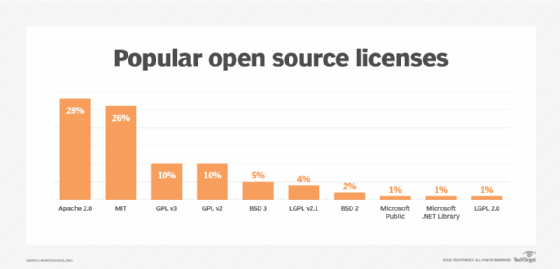What are BSD Licenses?
BSD licenses are a family of permissive open source licenses originally associated with the Berkeley Software Distribution (BSD), a Unix-like operating system. These licenses are known for having minimal restrictions on the use and redistribution of software, making them especially attractive for developers and organizations that want maximum freedom with fewer compliance obligations.
Unlike copyleft licenses, such as the GNU General Public License (GPL), BSD licenses allow for the incorporation of code into proprietary software. This makes them widely used in both academic and commercial software development.
Key features of BSD licenses
BSD licenses grant users the right to use, modify and redistribute source code, with very few obligations. There are several variants of BSD licenses, each with slightly different terms.
The classic four-clause BSD license includes:
- Redistribution of source code must retain the original copyright notice.
- Redistribution in binary form must reproduce the copyright notice in documentation or other materials.
- No endorsement clause forbids the use of the names of the original authors or organizations without prior permission.
- Liability disclaimer ensuring the original authors are not held responsible for any issues resulting from the software's use.
Common BSD license variants
Due to concerns over the no endorsement clause, the following variants were introduced:
- 4-clause BSD license (original). Includes all four conditions listed above.
- 3-clause BSD license (also known as "New BSD" or "Modified BSD"). Removes the no endorsement clause.
- 2-clause BSD license (also called "FreeBSD license"). Omits both the no endorsement clause and the advertising clause.
These licenses are approved by the Open Source Initiative and are considered GPL-compatible (except for the original four-clause version due to the advertising clause).
Advantages of BSD licenses
A primary advantage of BSD licenses is their flexibility. Developers are free to reuse BSD-licensed code in both open source and proprietary applications without facing significant restrictions.
This makes the license particularly attractive to startups and enterprises that want to build commercial products using open source components. The BSD license is also considered business-friendly, as it does not impose copyleft obligations like the GPL, which can require derivative works to remain open source.
As a result, companies can integrate BSD-licensed code into their proprietary software without the need to open their own source code. Additionally, the permissiveness of BSD licensing fosters innovation by reducing legal complexity. With fewer licensing constraints, developers can focus more on building and improving products, leading to faster development cycles and broader technology adoption.
BSD vs. GPL and MIT licenses
When choosing an open source license, it's important to consider how permissive or restrictive the terms are. Here are a couple of license comparisons:
BSD vs. GPL
GPL requires that derivative works remain open source (copyleft), while BSD allows proprietary reuse.
BSD vs. MIT
Both are permissive and have similar goals, but the MIT license uses simpler language and is often preferred for its brevity. The BSD license provides slightly more detailed clauses regarding redistribution and attribution.

Use cases and adoption of BSD licenses
BSD-licensed software is widely adopted across both open source and commercial ecosystems.
- FreeBSD. It is a Unix-like operating system commonly used in networking appliances and internet infrastructure due to its stability and performance.
- OpenBSD. It emphasizes security, is frequently found in firewalls and other critical security applications.
- NetBSD. It is known for its exceptional portability and has been used across a range of hardware platforms, from embedded systems to large servers.
In addition to OSes, BSD licenses are also used in key software components such as libc++ and LLVM, which form the foundation of Apple's development toolchain and are integral to the Clang compiler infrastructure.
Examine the importance and limitations of open source AI models. Learn about the advantages of open source for business applications, and explore open source platform-as-a-service options developers should know.
